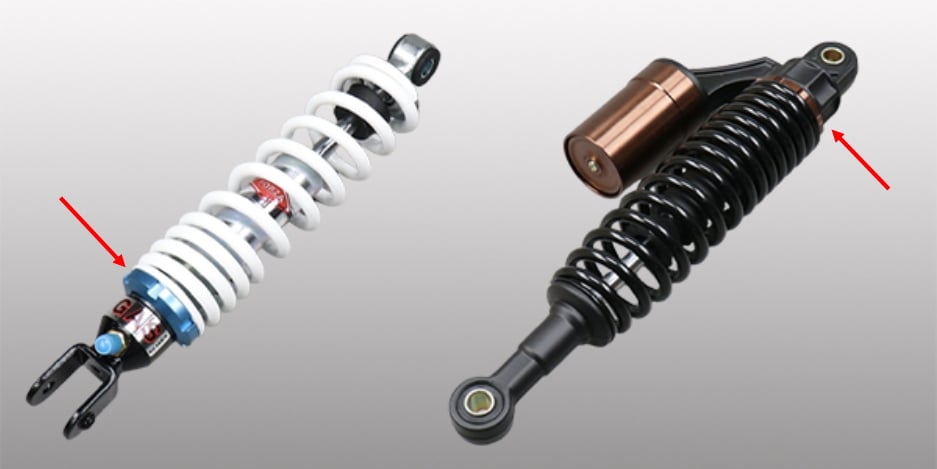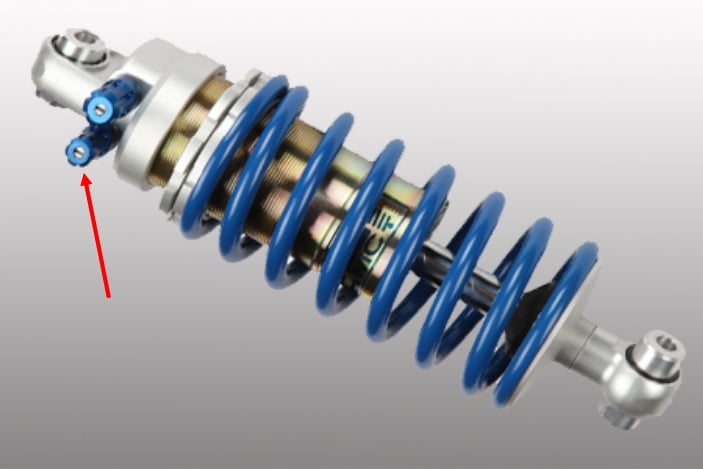Troubleshooting > Failures par brand > DERBI > DERBI Senda SM DRD Racing > Motorcycle DERBI Senda SM DRD Racing 50, soft shock absorber
The rear shock absorber of my boxed motorcycle DERBI Senda SM DRD Racing 50 is soft
Concerning the practice of motorcycling on the road, everything is framed par the state, everything must be homologated and must meet standards, regulatory requirements... This is not the case for the suspensions, which are so essential in the connection to the ground.
Most motorcyclists are aware of the importance of keeping an engine in good condition, many seek to improve its performance, to modify its operation, to optimize the power supply of their two wheels. The majority of motorcyclists also understand the importance of tires and watch over them and unfortunately, too few are interested in the importance of suspensions.
The cycle part of a two-wheeler is composed as follows:
- the frame (the frame of the motorcycle)
- swing arm
- the front suspension (fork)
- rear suspension (with one or two shock absorbers)
The first two elements are fixed, do not need to be maintained regularly. On the other hand, the suspensions are mobile, work, wear out, deteriorate with time and mileage. They require regular maintenance.
Their primary function is to absorb the shocks linked to irregularities in the road, to ensure the grip of the tires and the stability of the vehicle.
Always remember this: a correctly adjusted motorcycle should behave in the following way when the tank is pressed (roughly the center of the motorcycle), rider next to the motorcycle , motorcycle in balance:
The motorcycle should rise and fall symmetrically between front and rear.
Two things make up the suspension on your motorcycle DERBI Senda SM DRD Racing 50:
- the spring which generates the movements
- the hydraulics that master it
On a fork (like on a shock), there are three settings:
- pre-loaded
- compression
- relaxation
Adjusting your bike's preload DERBI Senda SM DRD Racing 50
The preload relates to the spring. The spring will be more or less compressed in order to adjust its hardness; in general the setting is done byar a nut and locknut system. Attention, on many models, there is not automatically the possibility of adjusting a shock absorber, they are sometimes without adjusting nut.
A spring that is too compressed will be very hard, which will not prevent it from properly fulfilling its role as a shock absorber. Conversely, a spring that is insufficiently compressed, and therefore too soft, will very quickly come to a stop.
If the spring is old and does not seem to be sufficiently compressed and it is not adjustable, we recommend that you replace it par a new model. Indeed, on small cylinders, they are most of the time "basic" and non-adjustable shock absorbers.
Adjusting your bike's compression DERBI Senda SM DRD Racing 50
The compression settings are currently those recommended spar fault par the constructor. It's up to you to see if you want to strengthen everything by tightening the compression adjustment screws, or on the contrary soften everything by loosening these same screws. Let's refine everything now by exerting pressure on the tank as indicated above:
- If the front goes down faster than the rear, it means that the rear is too compressed or that the front is not compressed enough. In these cases, release the rear by loosening the compression adjustment screw, or firm the front by tightening its adjustment screw.
- Conversely, if the rear goes down faster than the front, this means that the front is too compressed or that the rear is not compressed enough.
As for the adjustment of the preload, if you do not have a compression adjustment screw, then you will not be able to intervene on it, you will have to consider replacing the rear shock absorber on your 50 motorcycle AGM.
Additional information on the shock absorber for your caboete DERBI Senda SM DRD Racing 50
A flexible suspension adjustment seems to make the bike more forgiving, less lively, and a little less tricky, especially on bumpy surfaces, at good speed.
These aspects can be more harmful on roads, at high speed, and especially on circuits.
The adjustment principle is the same as that for preload or compression. This is a screw that controls a valve. The more the screw is tightened, the more the suspension will settle on repeated small shocks that do not have time to rise. Conversely, the more the screw is loosened, the more the suspension will tend to rise sharply.
If your shock absorbers are too soft and come into mechanical stop, the motorcycle risks swaying at high speed. It will be necessary to harden the spring preload (increase the preload). Otherwise it is that the spring is too flexible par in relation to your weight and the stresses imposed on it, and that it must be replaced.













